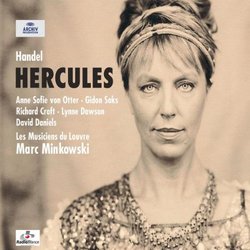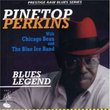| All Artists: George Frideric Handel, Marc Minkowski, Les Musiciens du Louvre, Anne Sofie von Otter, David Daniels, Gidon Saks, Richard Croft, Lynne Dawson, Marcos Pujol Title: Handel - Hercules, Musical Drama in Three Acts (HWV 60) Members Wishing: 1 Total Copies: 0 Label: Deutsche Grammophon Original Release Date: 1/1/2000 Re-Release Date: 4/2/2002 Album Type: Box set Genre: Classical Styles: Opera & Classical Vocal, Historical Periods, Baroque (c.1600-1750) Number of Discs: 3 SwapaCD Credits: 3 UPC: 028946953228 |
Search - George Frideric Handel, Marc Minkowski, Les Musiciens du Louvre :: Handel - Hercules, Musical Drama in Three Acts (HWV 60)
 | George Frideric Handel, Marc Minkowski, Les Musiciens du Louvre Handel - Hercules, Musical Drama in Three Acts (HWV 60) Genre: Classical Full of powerful drama and splendid music, this oratorio (an opera in all but name) has been neglected for reasons that remain a mystery. Marc Minkowski and his crack early-music band set things right, however, with a spar... more » |
Larger Image |
CD DetailsSynopsis
Amazon.com Full of powerful drama and splendid music, this oratorio (an opera in all but name) has been neglected for reasons that remain a mystery. Marc Minkowski and his crack early-music band set things right, however, with a sparkling performance Handelians will greet with joy. The story revolves around Dejanira's jealousy of hubby Hercules and her attempt to win the hero back, which ends in his death, her remorse, and the union of the young lovers, Hyllus, her son, and Iole, the foreign princess she mistakenly believes her rival. The singing is on a high level throughout, though the intense Dejanira ideally wants a bigger voice than von Otter's lighter, lyric instrument. Gidon Saks's big, resonant bass-baritone is superb, and Lynne Dawson's gorgeous soprano fits Iole perfectly. Richard Croft's firm tenor and imaginative singing make something special of Hyllus's every appearance. Only David Daniels's veiled singing disappoints in the important role of the Herald. At the 1744 premiere, Handel assigned the part to a contralto, so there's no historical justification for a countertenor here. A live 1958 La Scala performance (on Melodram), sung in Italian, is the only viable rival on disc; its deficiencies are compensated for by the presence of great voices including Elizabeth Schwarzkopf and Franco Corelli. But this excellent Archiv production now rules the roost. --Dan Davis Similar CDs
|
CD ReviewsMagnificent, Riveting Version of a Handel Masterpiece Nicholas A. Deutsch | New York, NY USA | 04/12/2002 (5 out of 5 stars) "Like "Semele," "Hercules" (1744) is a secular English-language drama drawn from classical mythology, composed at a time when Handel had turned from Italian opera to English oratorio. Though presented without scenery, costumes or stage action, this "Musical Drama" to a text by the Rev. Thomas Broughton (after Ovid, Sophocles & Seneca) is a stageworthy tragedy of love & jealousy -- Handel's librettist Charles Jennens, never one to mince words, called it "an English Opera." Although the only well-known piece from "Hercules" is Dejanira's mad scene "Where shall I fly?," nearly all the music is on a very high level, and when performed with skill & conviction, it's an immensely powerful work. This is such a performance, not only the best "Hercules" so far (in an admittedly spotty career on disc) but a fine achievement on its own merits. Conductor Marc Minkowski deserves credit first: this is gutsy, vibrant Handel conducting, & he has a fine orchestra & chorus to work with. Yes, he can take some breakneck tempi -- I wish Hyllus's 1st & 3rd airs were a shade slower, if only so that admirable tenor Richard Croft could get all the words out with full clarity -- but everything is alive & visceral. He makes Archiv's 1983 set, the stylish (though drastically cut) John Eliot Gardiner version, sound tame and genteel by comparison. Minkowski also has the strongest quintet of soloists so far, with some of the finest Handel singers around in peak form. Mezzo-soprano Anne Sofie von Otter as the jealous Dejanira is magnificent, everything phrase burning with meaning (she can send chills up your spine with the single word "Yes..."); unlike Dan Davis, I don't miss a "bigger voice" (by which I think he means weightier or darker): it's refreshing to hear a young-sounding Dejanira who isn't in the least matronly (like Sarah Walker for Gardiner, or the fearsome Fedora Barbieri in the impossible La Scala performance). As Iole, whom Dejanira believes erroneously to be her rival for Hercules' love, soprano Lynne Dawson presents a more mature & strong-willed character than usual. Richard Croft captures beautifully both the extrovert virility & the romantic, erotic yearning of Hyllus (Hercules' son & Iole's suitor), and bass-baritone Gidon Saks is a powerful Hercules, moving in his death agony. Countertenor David Daniels is starry casting as the herald Lichas (composed for a star contralto, Susannah Cibber); he makes the most of a dramatically passive role. My only reservations concern cuts & textual changes. Though this is the fullest version of "Hercules" yet - it runs 23 minutes longer than Gardiner's - it isn't complete. Of his six airs, Lichas loses a fair chunk of one ("The smiling hours," including the postlude, so Minkowski can link it directly to the next chorus) & all of another ("Constant lovers"); Iole gets to sing only the "A" section of her da capo aria "Banish love from thy breast." More troubling are two shifts of material, neither of which Handel ever made (and he made some eyebrow-raising changes in revivals of "Hercules"). Minkowski replaces "Constant lovers" with Lichas's earlier Act II air "As stars that rise": the words & the assertive music make great sense in the original location, where Lichas is defending Hercules against Dejanira's accusation of infidelity, but in the new one lose most of their relevance & dramatic point. Most puzzling of all is the treatment of Iole's entrance scene in Act I: her colloquy with her faithful maidservants is gone, save for the last few lines, which, with the ensuing air "Daughter of Gods, bright Liberty" are inserted later, between Hercules' air "The God of Battle" & the final chorus of Act I, "Crown with festal pomp." Theatrically, thematically, dramatically, psychologically, musically - in every way this strikes me as inferior to what Handel & Broughton wrote. Irritating if minor flaws on a great recording." A giddy response Scott Parsons | Sidney, OH United States | 05/10/2002 (5 out of 5 stars) "This is dangerously beautiful music performed to perfection. Anne Sofie von Otter has never sounded better, in my opinion, nor has she ever sung music more suited to her. The rest of the cast keeps up with her which says a lot I think for them and for Minkowski. Is Handel opera finally beginning to receive its due? I certainly hope so. It is every bit as celestial as his "greatest hits," or more so. I thank Handel, God and the producer of this recording - but Handel first." Truly dramatic S Duncan | London | 02/04/2005 (5 out of 5 stars) "This is a truly different and exciting take on Handel, if I may make so bold a statement. The singing has a somewhat modern flavour, being more convincing and less 'periodic'. I mean, when Anne Sofie von Otter almost sighs "Oh Hercules!" as her opening line, there's no mistaking HOW much Dejanira longs for him! We begin to understand, from her characterisation, how Dejanira could have ended up making the fatal blunder. With hindsight, this deserved less that 5 stars- at times von Otter sounds a little winded and perhaps a little too harsh (particularly in her ravings at the end when Dejanira discovers what she's done). There is less of the elegant phrasing and more hyterics and unsteadiness. Still, a dramatic account.
David Daniels does indeed sing in a "veiled" manner. His rich and opulent countertenor is one of this set's finer attributes at times but this is less secure purchase than I've heard elsewhere from him. His recount of Hercules' death is nonethelss stunning in its anguish. Lynne Dawson is, as usual, excellent: touching but with that sense of immediacy and realism that communicates so well with the listener. Like her Dido, this is a quietly commanding performance. Gidon Saks' voice has depth and sonority. Had it been a less dramatic reading on his part his voice would have been mirky but here he comes across with great authority and his suffering in the end is palpable. My main reservation is his speech rather than his voice. He sounds as if he had a blocked nose in the way he pronounced his 'n's and 'd's. "Where has Richard Croft been all this time?" I ask myself!!! This tenor is AMAZINGLY agile, dramatic and talk about a STUNNING voice!! I put him forward as easily the FINEST performer on the entire set. "Let not fame the tidings spread" is done with the sort of security and flair (not to mention enviable beauty) that makes you completely forget about how repetitive the aria is. Great stuff. Minkowski's conducting is very sensitive and his speeds moderate. The period intruments don't sound 'thin' but just add the right amount of surrealism. The orchestra sounds fabulous and they are very accurate. Likewise, the chorus is very elegant. A modern and well-produced recording that is overall very satisfying." |

